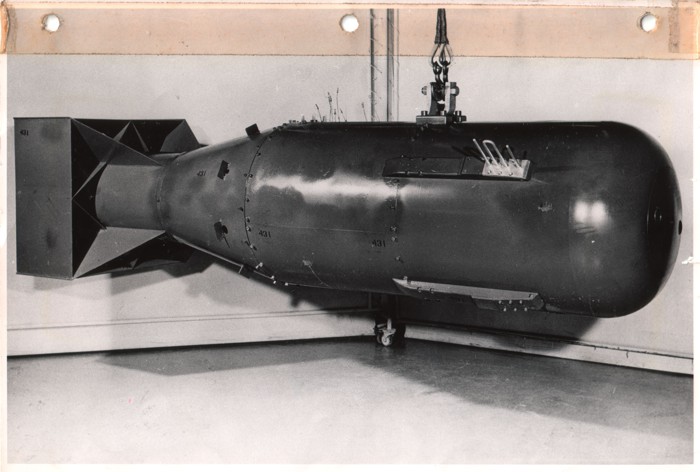
KNCA
Building an H-Bomb in Plain Sight
Usually countries build nuclear weapons in secret—but not North Korea.
North Korea’s latest nuclear weapon test is by far its largest yet. Preliminary analysis of the seismic signals it generated while exploding under a mountain last week suggest it was at least 100 kilotons in strength, and the North Koreans themselves claim it was “hundreds” of kilotons. (The bomb that destroyed Hiroshima was 15 kilotons.) This has led many analysts to suggest that North Korea has in fact developed a working hydrogen bomb.
North Korea has backed up its claim—sort of—by releasing photographs showing a peanut-shaped weapon that could fit into a missile nose cone. While an external weapon casing cannot tell one much about what actually is inside the weapon (it might be filled with jelly beans for all we know), it’s the clearest signal yet that the North Koreans desperately want the world to consider them a thermonuclear power.
That North Korea should have to go through such theatrics is an interesting inversion of more typical behavior of nuclear states. In the case of the United States, nuclear weapons are shrouded in secrecy, and the casings themselves kept largely invisible until they have been phased out of service. The shapes of the first nuclear weapons, Little Boy (Hiroshima) and Fat Man (Nagasaki), were considered national secrets until 1960, a full 15 years after their first use in war. The exact appearances of the warheads that top U.S. ballistic missiles are still secret (the “dunce cap” reentry vehicles that they fit inside are not); of the warheads that makeup the American “enduring stockpile,” there are a few whose images have been declassified—they look like thermos bottles—but they are all weapons that are used in gravity bombs dropped out of planes or cruise missiles.

The Fat Man nuclear warhead (U.S. National Archives and Records Administration)
What’s in a warhead shape? Quite a lot, actually: In many cases, a trained eye can get a lot of “useful” design information out of them, especially if combined with reasonable assumptions about how much plutonium might be in the weapon, how much the weapon weighs, and how explosive the weapon is. The United States doesn’t like to show pictures of its warheads, lest they help other states reverse engineer its most sophisticated weapons.
North Korea has the opposite problem. It isn’t trying to staunch the proliferation of weapons by small states. It is one of those states. North Korea’s problem is credibility, not just in general, but in what the game theorists call credible deterrence. The North Koreans want the United States and everyone else to take their nuclear threats seriously.

The Little Boy nuclear warhead (U.S. National Archives and Records Administration)
The real danger for North Korea is if the United States doesn’t consider their threat credible. If the United States thinks the North Koreans are on the verge of having weapons that can threaten the United States, or Seoul, or Tokyo, then it might be tempted to try and preemptively stop North Korea’s progress. North Korea obviously doesn’t want that. If the North Koreans do have this capability, the United States might not want that, either: If the United States attempted to assassinate Kim Jong Un, or destroy their nuclear capability, it might be the sort of action that would actually trigger the North Koreans to launch a nuclear-tipped missile, assuming they have them ready to go. The North Korean dictator is probably not suicidal (though really, who knows), but he has made it clear that any attempts to destroy him or his country would be very painful to the United States. There is no reason not to believe his resolve on this front.
Is it possible that the North Koreans actually have developed a thermonuclear weapon, and a missile that could reach U.S. interests? It’s certainly not impossible. The first thermonuclear weapon was tested 65 years ago this year. The Soviet Union tested its first megaton-range weapon 62 years ago. China tested its own 50 years ago. Even working under the assumption that North Korea’s progress was slower, its program poorer, and its work conditions abysmal, in 2017, it still wouldn’t need Nobel Prize–worthy scientists to pull this off.
The basic concepts behind multistage thermonuclear weapons were declassified in the United States by 1980, and many details were released in the 1990s through scientific publications in the field of inertial-confinement fusion, which involves very similar physics. To be clear: It’s not the declassifications that made this “easier”; these things were declassified because it was obvious to everyone involved that this information was already more or less “out there,” and that the classification itself was outdated.
The first H-bomb was designed using computers like the ENIAC, a room-sized machine that could do 5,000 addition operations per second. An iPhone’s processor, by contrast, can process billions of operations per second, as can most desktop computers. A friend of mine at MIT recently used Amazon’s Web Services to emulate a supercomputer with the equivalent processing power of over 3,000 standard desktop machines (which is to say, trillions of operations per second), at small a fraction of the price that would come with operating an actual, physical supercomputer. Even if you accept that these physics problems are still hard ones (which isn’t clear), the tools that one can use to tackle them have advanced by light-years since the early Cold War.
So could they have an H-bomb? Well, why not? If they don’t have two-stage weapons yet—that is, if they are “just” boosting fission weapons with small amounts of fusionable materials—they will soon. Because this is the kind of thing that states who test lots of nuclear weapons are capable of doing, eventually. And at some level, it hardly matters: If they can pull off 100 kilotons, then you might as well treat them like they have an H-bomb. Because it’s good enough. Even 20 kilotons, which is what they were estimated to have as of a year ago, is enough to cause enough destruction that it wouldn’t be worth risking except in the most dire of circumstances.
What about their missiles? Contrary to the technology tree of the Civilization game series, intercontinental ballistic missiles (ICBMs) came after thermonuclear weapons, but only by a few years. We are rapidly approaching the 60th anniversary of the Soviet Union’s launch of Sputnik, the first satellite, which was put into orbit on top of the R-7, the first ICBM. So this isn’t brand-new technology, either. To be sure, rocket science is, to some degree, still “rocket science.” Even Elon Musk’s rockets still occasionally blow up, and nobody doubts the competence of his engineers. Both the American and Soviet rocket and space programs suffered terrible accidents, and the number of things that can go wrong in a “real-world” application of missiles is, well, astronomical. And yet, with effort, these sorts of things largely get figured out. North Korea’s tests haven’t been universally successful (which may be because of sabotage, or just because it is legitimately hard), and there are debates among experts as to what kind of missile range we can expect them to currently have, but it’s clear they’re putting a lot of effort into it, and if they aren’t currently capable of hitting the continental United States, they will be, soon. They almost certainly can hit closer targets that we value, such as Japan, and potentially even Hawaii.
Nuclear deterrence doesn't require mutually assured destruction. It's easy to think this if you were raised with the idea that nuclear deterrence is about the United States versus the Soviet Union or Russia, two countries with huge arsenals encompassing over 90 percent of the world’s nuclear weapons.
North Korea can’t destroy the United States. It could, however, cause us a lot of hurt. A nuclear-armed North Korea doesn’t have to change much: Just don’t box them into a corner, stay firm on what is truly unacceptable behavior, and be willing to compromise for mutual benefit. We shouldn’t find living in the nuclear age any more anxious than it has been for the past many decades: North Korea isn’t demonstrably “crazier” than the People’s Republic of China was during the heyday of its Cultural Revolution when it went nuclear, and our situation, while nerve-wracking, isn’t more existential than it was during the 1980s. The nukes of the Cold War haven’t gone away, and adding one more country to the list—while definitely not an optimal situation—isn’t going to change much. One hopes that our military leaders understand this, because if history is any guide, the most likely path to nuclear war won’t be outright aggression, but a comedy of tragic errors, misunderstandings, and miscommunications.

